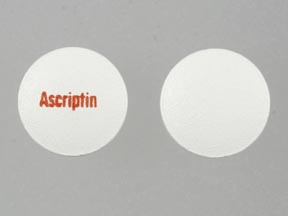Ascriptin and Alcohol/Food Interactions
There are 2 alcohol/food/lifestyle interactions with Ascriptin (aspirin).
Aspirin Caffeine
Minor Drug Interaction
Information for this minor interaction is available on the professional version.
Aspirin Alcohol (Ethanol)
Moderate Drug Interaction
Ask your doctor before using aspirin together with ethanol (alcohol). Do not drink alcohol while taking aspirin. Alcohol can increase your risk of stomach bleeding caused by aspirin. Call your doctor at once if you have symptoms of bleeding in your stomach or intestines. This includes black, bloody, or tarry stools, or coughing up blood or vomit that looks like coffee grounds. It is important to tell your doctor about all other medications you use, including vitamins and herbs. Do not stop using any medications without first talking to your doctor.
Switch to professional interaction data
Ascriptin drug interactions
There are 378 drug interactions with Ascriptin (aspirin).
Ascriptin disease interactions
There are 9 disease interactions with Ascriptin (aspirin) which include:
- coagulation
- asthma
- GI toxicity
- renal dysfunction
- Reye's syndrome
- anemia
- dialysis
- G-6-PD deficiency
- hepatotoxicity
More about Ascriptin (aspirin)
- Ascriptin consumer information
- Check interactions
- Compare alternatives
- Drug images
- Latest FDA alerts (3)
- Side effects
- Dosage information
- During pregnancy
- Drug class: platelet aggregation inhibitors
- Breastfeeding
Related treatment guides
Drug Interaction Classification
| Highly clinically significant. Avoid combinations; the risk of the interaction outweighs the benefit. | |
| Moderately clinically significant. Usually avoid combinations; use it only under special circumstances. | |
| Minimally clinically significant. Minimize risk; assess risk and consider an alternative drug, take steps to circumvent the interaction risk and/or institute a monitoring plan. | |
| No interaction information available. |
See also:
Further information
Always consult your healthcare provider to ensure the information displayed on this page applies to your personal circumstances.


